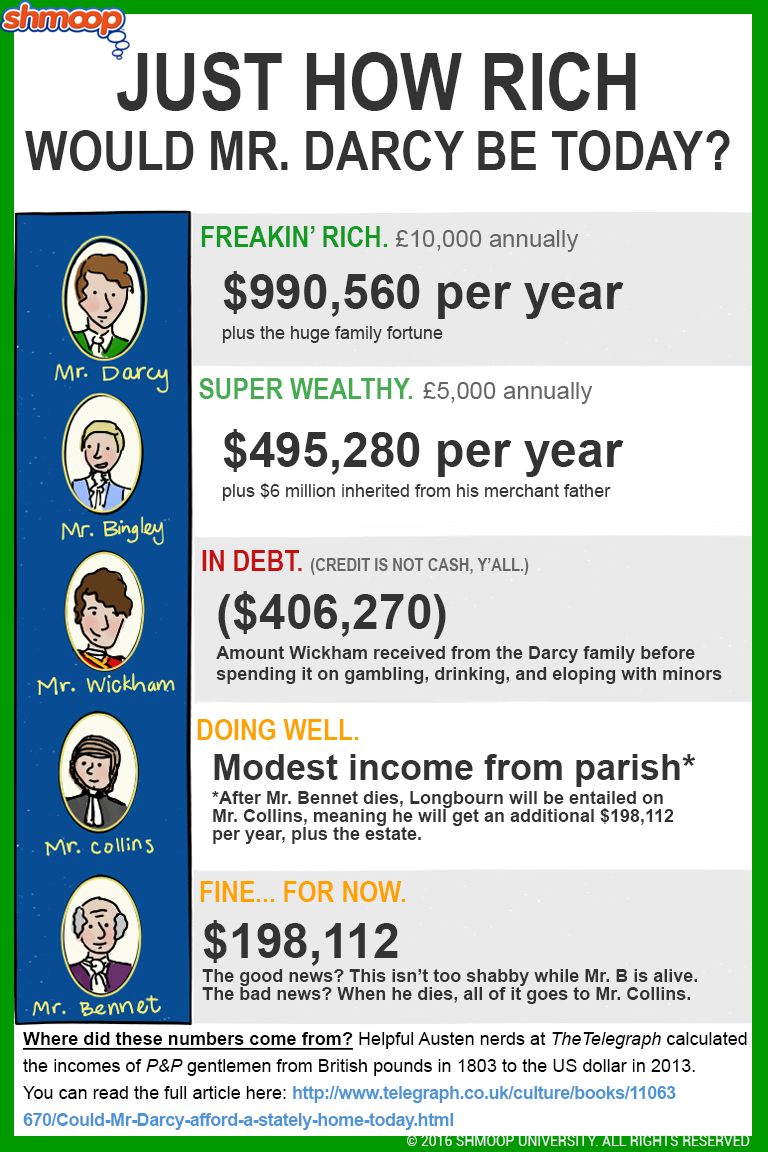Character Analysis

(Click the character infographic to download.)
A seemingly perfect gentleman from a poor family, Wickham turns out to be the Bennet family's worst nightmare. (Although "Wickham" sounds so close to the word "wicked" that Austen gives half the game away the first time we meet this jerk. Coincidence? Eh, probably not.)
If Darcy's deal is learning to be a gentleman on the outside and not just the inside (which we think it is—check out his character analysis for more), then Wickham is the total reverse of that. He is super-charming, really good-looking, great to be with, and generally delightful to all the senses. We're pretty sure he smells nice, too.
Everyone in Meryton is fooled, and Elizabeth even thinks about him in a marriageable kind of way. In reality, though? Let's count the skeletons hanging in his closet: Financial chicanery? Check. Character assassination of his closest friends and allies? Check. Attempted seduction of one underage girl? Check. Successful seduction of another one? Followed by some heavy-duty extortion to agree to marry her? Indeed.
(And before you go, "Hey, didn't everyone marry at 15 back then?"—nope. Most women in the early nineteenth century actually married in their early twenties, just a few years younger than today's average.)
Charm School
Just look at this guy:
His appearance was greatly in his favour; he had all the best part of beauty, a fine countenance, a good figure, and very pleasing address. The introduction was followed up on his side by a happy readiness of conversation—a readiness at the same time perfectly correct and unassuming; (15.8)
Austen is really laying it on thick, but it's nothing compared to Elizabeth. She thinks that Mr. Wickham is "as far beyond [the other offices] in person, countenance, air, and walk, as they were superior to the broad-faced, stuffy uncle Phillips, breathing port wine, who followed them into the room" (16.3). (To be fair, how many young men can Lizzy have possibly met at this point in her life?)
Anyway, it's no wonder that she immediately believes everything he says, like that Darcy is a no-good jerk. It's only after Darcy himself has cleared his own character and pointed out that Wickham isn't quite the angel he seemed that she realizes he's been taken in. In retrospect, Wickham's manners were actually, well, kind of bad:
She was now struck with the impropriety of such communications to a stranger […] She saw the indelicacy of putting himself forward as he had done, and the inconsistency of his professions with his conduct. She remembered that he had boasted of having no fear of seeing Mr. Darcy—that Mr. Darcy might leave the country, but that he should stand his ground; yet he had avoided the Netherfield ball the very next week. She remembered also that, till the Netherfield family had quitted the country, he had told his story to no one but herself; but that after their removal it had been everywhere discussed; that he had then no reserves, no scruples in sinking Mr. Darcy's character, though he had assured her that respect for the father would always prevent his exposing the son. (36.5)
In other words, he's a liar, a coward, and a conman. Gee. We almost feel sorry for Lydia.

(Click the infographic to download.)